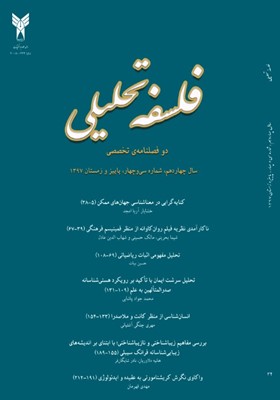انسانشناسی از منظر کانت و ملاصدرا
محورهای موضوعی : فلسفه
کلید واژه: کانت, ملاصدرا, انسانشناسی, تعلیمی, توصیفی, خلیفه الهی,
چکیده مقاله :
کانت و صدرالمتالهین دو فیلسوف بزرگی هستند که در بحث انسانشناسی معتقدند انسان هویت ثابتی ندارد. از نظر ملاصدرا انسان تنها موجودی است که ماهیت معینی ندارد و حقیقت او فعلیتهای او نیست، بلکه بینهایت امکانهایی که در پیشروی او است، واقعیت او را شکل میدهد. از دیدگاه کانت هم انسان صرفاً از ماهیت ثابتی برخوردار نیست. انسانها با اعمال و رفتار خویش بهویژه در ارتباط متقابل با دیگران و در سطح اجتماع به هویت خود شکل میدهند. هر دو فیلسوف به خالقیت و آفرینندگی عقل توجه ویژه داشتهاند. کانت کوشید محدودیتهایی که در عقل نظری وجود داشت به یاری عقل عملی برطرف کند، لذا با بحث اراده خیر که مهمترین ویژگی و مبنای تحقق انسانیت است، زیر بنای اخلاق اومانیستی را پایهریزی کرد. از دیدگاه کانت انسان با اتکاء به عقل خویش به هویتش شکل میبخشد. اما انسانشناسی فلسفی صدرالمتألهین برخلاف کانت بیشتر بر عقل نظری تکیه دارد. عقل نظری با اتحاد و اتصال، با عقل فعال به مرحله عقل مستفاد میرسد. انسان خلیفه الهی و جامع تمام اسماء صفات حق است. انسان هم صفات تنزیهی و هم صفات تشبیهی دارد و خداوند به انسان استعداد ادراک تمام مدرکات را عطا کرده است، لذا انسان میتواند تمام حقایق کلی و جزئی را بشناسد و بنابر اتحاد عالم و معلوم، جهانی عقلانی شبیه به جهان خارجی میگردد و این معنای جامعیت انسان و خلافت الهی است.
Kant is a great philosopher who, in the context of anthropology, believes that humans do not have a stable identity. In Mulla Sadra's view, man is the only being which does not have a certain nature and his truth would not be his actions; rather the infinite possibilities ahead of him would form his reality. From Kant's point of view, man is not of a steady nature; humans shape their identities through their actions and behaviors, especially in their interaction with others and in the community. Both philosophers have given special attention to creativity and intellectual creation. Kant tried to eliminate the limitations of theoretical reason with the aid of practical reason, thus established the basis of humanistic ethics through discussing the good will which is the most important feature of the realization of humanity. But the philosophical anthropology of Sadr Al-Muta Allihin, in contrast to Kant’s, is based on theoretical theory. The theoretical intellect promotes to the Acquired Intellect by conjunction and union with the Active Intellect. Humans are God’s caliphs having all his divine names and attributes. They have the attributes associated with both tanzih and tashbih. God has bestowed upon them the ability to perceive everything, so that they can recognize all universal and partial truths. Thus, due to the unity of the knower and the known, the rational universe becomes similar to the external world. This is what human integrity and divine caliph mean.
_||_

